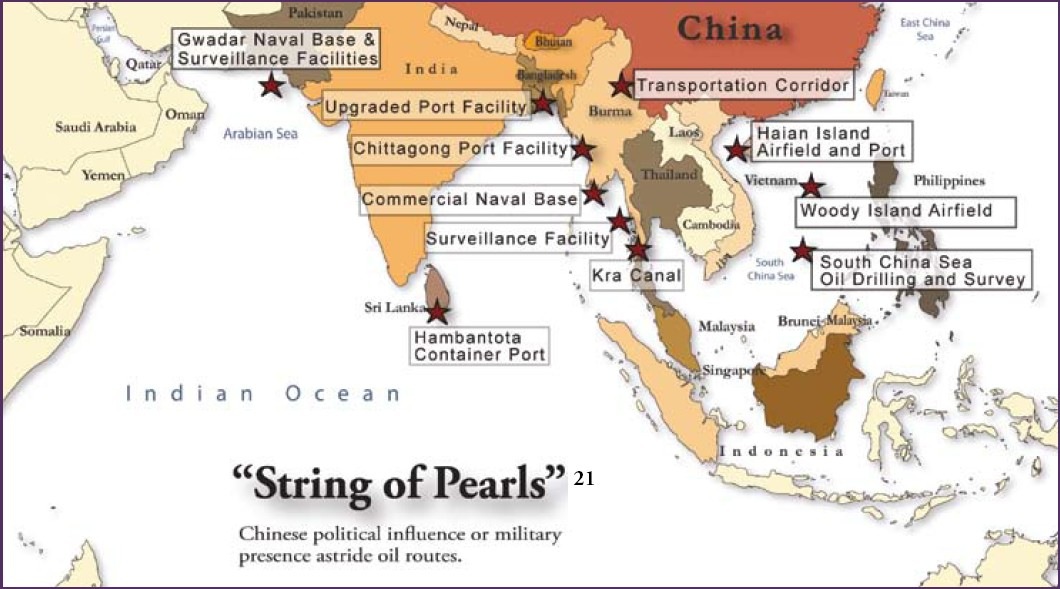
Posted on 05/26/2011 9:44:47 PM PDT by sukhoi-30mki
Few reasons to fear China's 'pearls' Ashley Townshend
From: The Australian
REVELATIONS that Pakistan has invited China to construct a naval base at the strategically located port of Gwadar have intensified anxieties about Beijing's Indian Ocean objectives. For many observers, any militarisation of the Gwadar facility - a predominantly Chinese-funded commercial port about 500km from the Strait of Hormuz - would confirm deep-seated suspicions about Beijing's so-called "string of pearls" strategy.
According to proponents of this view, China is establishing ports throughout littoral South Asia as a smokescreen for intelligence gathering and as a precursor to more permanent basing arrangements. Many worry that ostensibly commercial ports in Pakistan, Sri Lanka, Bangladesh and Burma will eventually be transformed into fully-fledged naval facilities. Access to such bases would enable Beijing to project military power right across the Indian Ocean - challenging US naval primacy, encircling India and threatening the sea lanes that transport about 25 per cent of the world's oil.
But there are many reasons to be sceptical about this hypothesis.
While Chinese state-owned corporations have bankrolled commercial "pearls" in South Asia, there's no evidence to suggest these have a military dimension. All are unfortified container ports designed to connect maritime supply chains to a growing network of continental roads, railways, pipelines and airfields. Most serve to link the land-locked provinces of southwestern China to the lucrative trade routes of the Indian Ocean.
Beijing's strategic interests to the west of Singapore appear more concerned with energy security than naval power. Since almost 80 per cent of its oil imports must traverse the Indian Ocean's vast and vulnerable waterways, China's main maritime objective is to secure its hydrocarbon lifeline. A string of
(Excerpt) Read more at theaustralian.com.au ...

Don’t forget about Panama. The moment “Jimma” threw away the Panama Canal, China was right there to pick it up.
Don’t forget about Panama. The moment “Jimma” threw away the Panama Canal, China was right there to pick it up.
I keep hearing about this, but I have yet to see a shred of evidence of it (I don’t mean some guy in washington with a map talking) It is pretty much run by the same PCC that ran it under the US, with 10 years of labor force turnover. I know folks that work in the commission and they are at a loss to figure out how people can actually think the balboa/cristobal ports deal = running the panama canal.
I point out that since the chinese did apparently buy the clinton administration on many very serious issues, they assume that in addition to buying governments that the chinese can just out and take over the primary national resource of a country as well, in this case the Panama Canal.
Carter gave up the canal via treaty in 76/79; china didn’t start showing a major presence in panama until the mid-late 90’s, just like the US and pretty much everywhere else outside asia.
Thanks sukhoi-30mki. I suspect this guy’s either in the bag for foreign interests, or is just a gasbag.
http://www.lowyinstitute.org/StaffBio.asp?pid=810
Jimmy Carter was nuts to give up the Panama Canal, but the Canal (and all of Latin America) cannot be defended from American attack. The part in parenthesis is why Nazi Germany's ideologically-simpatico fascist South American allies declared their neutrality during WWII and in fact jumped on the bandwagon (symbolically) late in the war on the Allied side. Besides, Hutchison Whampoa, the Hong Kong company that operates one of the ports, is an old line British trading company that got its start exporting opium to China almost 200 years ago. It is not a Chinese state-owned company. It was a port operator long before the Chinese takeover of Hong Kong in 1997.
Disclaimer: Opinions posted on Free Republic are those of the individual posters and do not necessarily represent the opinion of Free Republic or its management. All materials posted herein are protected by copyright law and the exemption for fair use of copyrighted works.